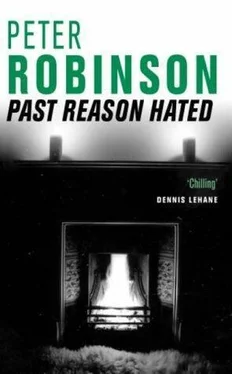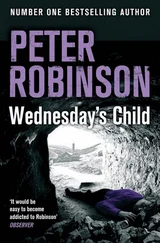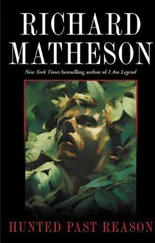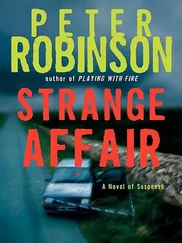She had bought and wrapped her presents days ago. She would try to pay a visit home next week or early in the new year. Somehow, it was easier on non-festive occasions. The forced enjoyment of the season only exacerbated her discomfort. For the same reason, she had always hated and avoided New Year’s Eve parties.
The TV picture still looked blurred. When she closed her eyes, the world spun around and seemed to pull her into a swirling vortex that made her stomach heave. She opened her eyes again quickly. She felt sick but didn’t want to get up. The third time she tried, her thoughts settled down and she fell into an uneasy sleep.
In her dream she moved into a room like the one Gary Hartley lived in, and she called it home. A high-ceilinged, dark, cold place crumbling around her as she stood there. And when she looked at the far wall it wasn’t a wall at all but a mesh of cobwebs beyond which more ruined rooms with dusty floorboards and walls of flaking plaster stretched to infinity. When she went over to investigate, a huge fat spider dropped from the ceiling and hung inches from her nose. It seemed to be grinning at her.
Susan’s own scream woke her. As soon as she came to consciousness she realized that she had been struggling for some time to get out of the nightmare. Her clothes were mussed up and a film of cold sweat covered her brow. Frantically, she looked around her at the room. It was the same, thank God. Dull, empty, characterless, but the same.
She staggered to the kitchen and splashed her face with cold water. Too much to drink. That Old Peculiar was powerful stuff. And Richmond had insisted on buying her a brandy and Babycham. No wonder she felt the way she did. She cursed herself for the fool she was and prayed to God she hadn’t made an idiot of herself in front of the others.
She looked at her watch: seven o’clock. Her head felt a little clearer now, despite the dull ache behind her eyes.
She couldn’t shake the dream, though, or the sense of panic it had caused in her. She made tea, paced about the room while the kettle boiled, switching TV channels; then, suddenly, she knew she had to do something about her bare, joyless flat. She couldn’t go home, but neither could she spend Christmas Day in such a miserable place. The visit to Gary Hartley had shaken her up even more than she’d realized.
Panicking that it might be too late, she looked at her watch again. Twenty to eight. Surely some places in the shopping centre would be staying open extra hours tonight? Every year, Christmas seemed to get more and more commercial. They wouldn’t miss a business opportunity like Christmas Eve, all those last-minute, desperate shoppers, guilty because they’ve forgotten someone. Susan hadn’t forgotten anyone except herself. She grabbed her coat and dashed for the door. Still time. There had to be.
Christmas Dayin the Banks household passed the way Christmas Days usually pass for small families: plenty of noisy excitement and too much to eat and drink. Downstairs at nine o’clock – a great improvement over the ridiculously early hours they had woken up on Christmas mornings past – Brian and Tracy opened their presents while Sandra and Banks sipped champagne and orange juice and opened theirs. Outside, framed in the bay window, fresh snow hung heavy on the roofs and eaves of the houses opposite and formed a thick, unmarked carpet across street and lawns alike.
Banks and Sandra were happy with their presents – mostly clothes, book or record tokens and the inevitable aftershave, perfume and chocolates. Brian quickly disappeared upstairs with his guitar, and Tracy spent an hour in the bathroom preparing herself for dinner.
Gristhorpe arrived about noon. They ate at one thirty, got the dishes out of the way as quickly as possible, then watched the Queen’s Message, which Banks found as dull and pointless as ever. The rest of the afternoon the adults spent variously chatting, drinking and dozing. Around teatime, Banks and Sandra made a few phone calls to their parents and distant friends.
In deference to Gristhorpe’s tin ear, Banks refrained from playing music most of the time, but later in the evening, when Brian and Tracy had gone up to their rooms and the three adults sat enjoying the peace, he couldn’t restrain himself. Off and on, he had been thinking about Caroline Hartley and was anxious to check out the music. He was sure that it had some connection with the murder. Now he could hold back no longer. He searched through his cassette collection for the Vivaldi he thought he had. There it was: the Magnificat, with Laudate pueri and Beatus vir on the same tape.
First he put on the record that Vic Manson had sent over from forensics. The familiar music, with its stately opening and pure, soaring vocal, disturbed him with the memory of what he had seen in Veronica Shildon’s front room three days ago. He could picture again the macabre beauty of the scene: blazing fire, Christmas lights, candles, sheepskin rug, and Caroline Hartley draped on the sofa. The blood had run so thickly down her front that she had looked as if she were wearing a bib, or as if an undergarment had slipped up over her breasts. Carefully, he removed the needle.
‘I was enjoying that,’ Sandra said. ‘Better than some of the rubbish you play.’
‘Sorry,’ Banks said. ‘Try this.’
He put the cassette in the player and waited for the music to start. It was very different. The opening was far more sprightly, reminiscent of ‘Spring’ from The Four Seasons.
‘What are you after?’ Sandra asked.
Banks stopped the tape. ‘They’ve got the same title, by the same composer, but they’re different.’
‘Any fool can hear that.’
‘Even me,’ Gristhorpe added.
‘Claude Ivers was right then,’ Banks muttered to himself. He could have sworn he had a piece by Vivaldi called Laudate pueri, but he hadn’t recognized the music he heard at the scene.
The sleeve notes for the record told him very little. He turned to the cassette notes and read through the brief biographical sketch: Vivaldi – affectionately called ‘ il prete rosso ’ because of his flaming red hair – had taken holy orders, but ill health prevented him from working actively as a priest. He had served at the Pietà, a kind of orphanage-cum-conservatory for girls in Venice, from 1703 to 1740 and would have been asked to compose sacred music when there was no choirmaster.
The blurb went on, outlining the composer’s career and trying to pin down dates of composition. The Laudate pueri had probably been written for a funeral at the Pietà. One of its sections – the antiphon, ‘ Sit nomen Domini ’ – revealed the liturgical context as a burial service for very young children. There was more about Vivaldi’s setting being hardly solemn enough for a child’s funeral, but Banks was no longer paying attention. He went back to the word sheet enclosed in the record sleeve and read through the translation: so few words so much music.
According to the translator, ‘ Sit nomen Domini benedictum ex hoc nunc et usque in saeculum ’ meant, ‘Blessed be the name of the Lord; from henceforth now and for ever’. What that had to do with funerals or children Banks had no idea. He realized he didn’t know enough about the liturgy. He would have to talk to a churchman if he really wanted to discover the true relevance of the music.
The main point, however, was that what Banks now knew how the music tied in with the information he had got from Glendenning’s post-mortem. Caroline Hartley had given birth to a child. According to Banks’s theories so far, this had either been the reason for her flight to London or it had occurred while she had been there. Another chat with Veronica Shildon might clear that up.
Читать дальше












